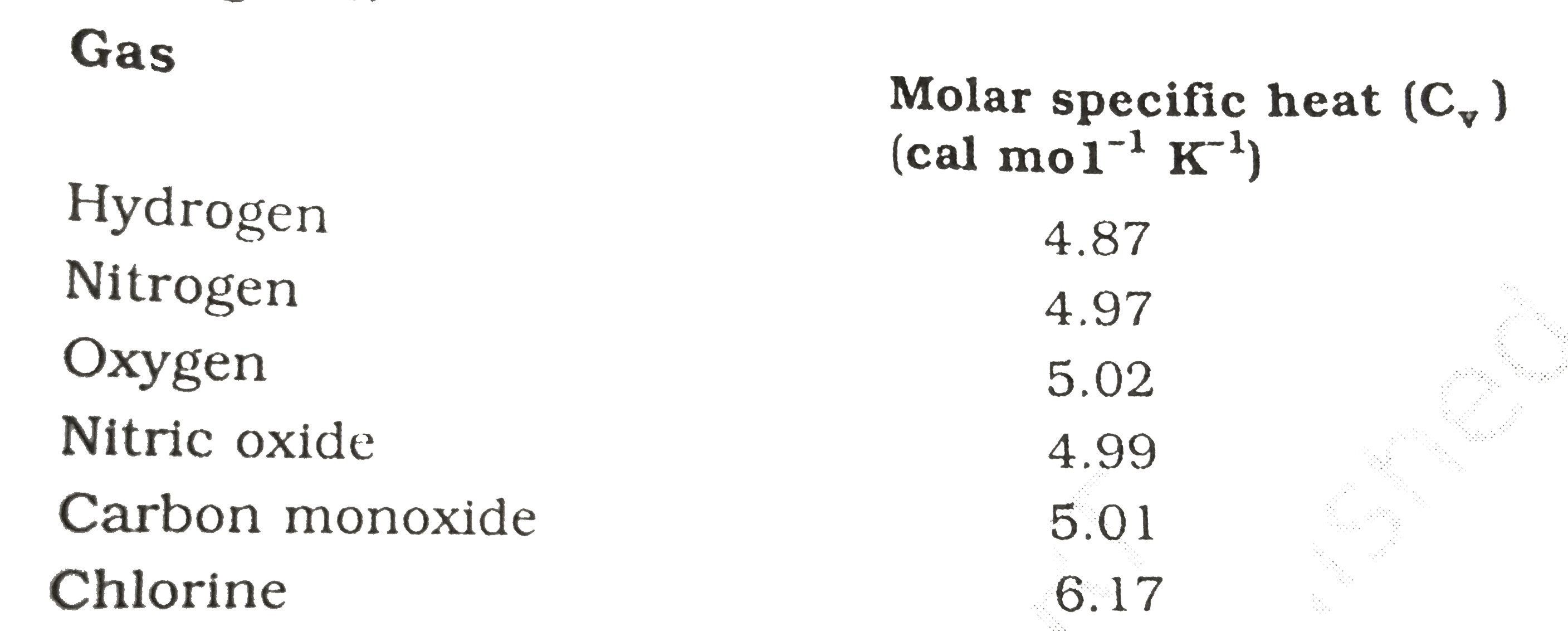Given below are observations on molar specific heats at room temperature of some common gases

The measured molar specific heats of these gases are markedly different from those for monoatomic gases. Typically, molar specific heat of a monoatomic gas is 2.92 cal/mol K. Explain this difference. What can you infer from the somewhat larger (than the rest) value for chlorine ?
The gases listed in the table are diatomic and have other degrees of freedom (that is have other modes of motion like vibrational and rotational) possible besides the translational degrees of freedom. To raise the temperature of the gas by a certain amount, heat is to be supplied to increase the average energy of all the modes. Consequently, molar specific heat of diatomic gases is more than that of monatomic gases. It can be shown that if only rotational modes of motion are considered, the molar specific heat of diatomic gases is nearly 52 R which is equal to 52×1.98=4.95 which agrees well with all the observations listed in the table except for chlorine. The higher value of molar specific heat of chlorine indicates that besides rotational modes, vibrational modes are also present in chlorine at room temperature.
Topper's Solved these Questions
- BOOK - MODERN PUBLICATIONCHAPTER - THERMAL PROPERTIES OF MATTEREXERCISE - HIGH ORDER THINKING SKILLS AND ADVANCED LEVEL10videos
THERMAL PROPERTIES OF MATTER
- BOOK - MODERN PUBLICATIONCHAPTER - THERMAL PROPERTIES OF MATTEREXERCISE - REVISION EXERCISE (VERY SHORT ANSWER QUESTION)33videos
THERMAL PROPERTIES OF MATTER
- BOOK - MODERN PUBLICATIONCHAPTER - THERMAL PROPERTIES OF MATTEREXERCISE - TOUGH AND TRICKY PROBLEM10videos
THERMAL PROPERTIES OF MATTER
- BOOK - MODERN PUBLICATIONCHAPTER - SYSTEMS OF PARTICLES AND ROTATIONAL MOTIONEXERCISE - Chapter Practice Test (for Board Examination)16videos
SYSTEMS OF PARTICLES AND ROTATIONAL MOTION
- BOOK - MODERN PUBLICATIONCHAPTER - UNITS AND MEASUREMENTEXERCISE - CHAPTER PRACTICE TEST15videos
UNITS AND MEASUREMENT
Similar Questions
Given below are observations on molar specific heats at room temperature of some common gases

The measured molar specific heats of these gases are markedly different from those for monatomic gases. Typically, molar specific heat of a monatomic gas is 2.92 cal/mol K. Explain this difference. What can you infer from the somewhat larger (than the rest) value for chlorine ?View SolutionGiven that the interatomic distance between the molecules of a diatomic gas remains constant, what is the value of molar specific heat of the gas?
View Solution
Knowledge Check
- Question 1 - Select One
At constant volume, for different diatomic gases, the molar specific heat
Ais same and 3 cal/mol∘C approximatelyBis same and its value is 4 cal/mol∘C.Cwill be totally differentDare approximately equal and its value is 5 cal/mol∘C - Question 2 - Select One
One mole of mono atomic gas is mixed with 2 moles of diatomic gas. What is the value of molecular specific heat of the gas at constant prssure in cal/mol K? (R=2 cal/mol K)
A1.5B6.32C3.5D4.16 - Question 3 - Select One
The molar specific heat of a gas at constant volume is 12307.69 J kg−1K−1. If the ratio of the two specific heats is 1.65, calculate the difference between the two molar specific heats of gas.
A7999 J kg−1K−1B7245 J kg−1K−1C6890 J kg−1K−1D4067 J kg−1K−1
Calculate the molar specific heat of monoatomic gas at constant volume. (R=8.314Jmol−1K−1)
View SolutionOne mole of an ideal monoatomic gas is mixed with one mole of an ideal diatomic gas. The molar specific heat of the mixture at constant volume is (in Calories )
View Solution1mole of an ideal monoatomic gas is mixed with 1mole of an ideal diatomic gas. The molar specific heat of the mixture at constant volume is :
View SolutionExplain what is meant by specific heat of a substance. What are its units? How is molar specific heat different from specific heat?
View SolutionThe molar specific heat of a gas at constant volume is 24 J/mol K. then change in its internal energy if one mole of such gas is heated at constant from 10∘C to 30∘C is
View Solution

